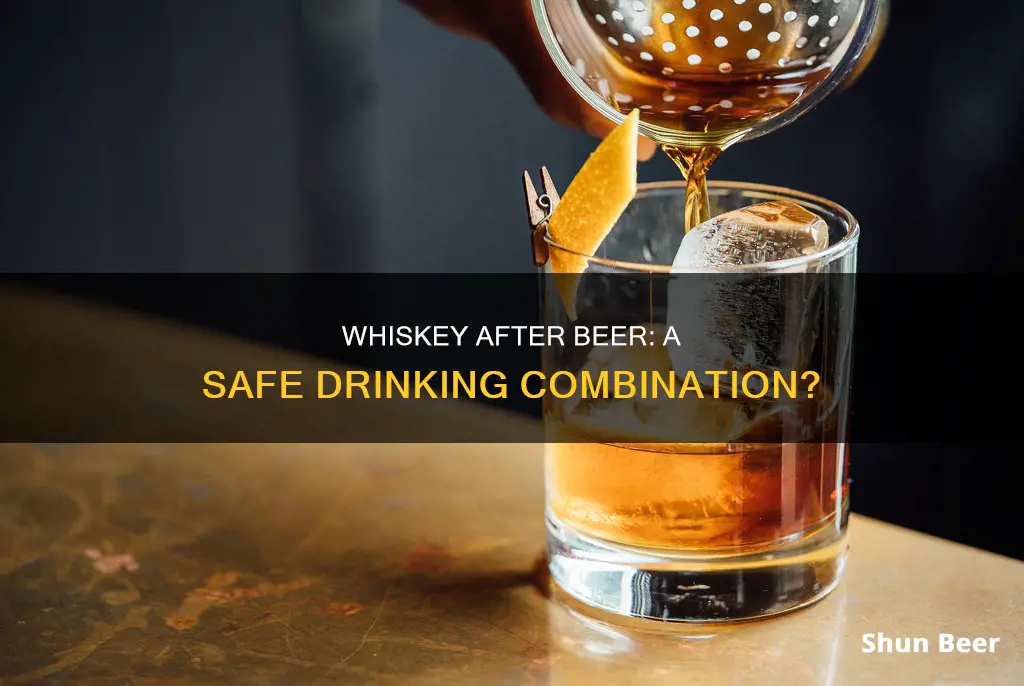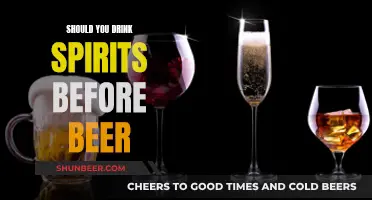
There are many theories about whether it is okay to drink beer before whiskey or whiskey before beer. One popular saying goes, beer before liquor, never been sicker; liquor before beer, you're in the clear. This suggests that drinking beer before whiskey can worsen a hangover. However, modern research has disproven this myth, indicating that the order of consumption does not influence a hangover. Instead, the total amount of alcohol consumed is the critical factor in determining hangover severity. Other factors influencing hangovers include acetaldehyde, disrupted sleep, genetics, congeners, and smoking. While the order of drinks may not affect the hangover, drinking whiskey after beer can offer complementary flavor pairings and creative cocktail opportunities.
| Characteristics | Values |
|---|---|
| Is it okay to drink whiskey after beer? | Yes, as long as it is done in moderation and responsibly. |
| Why is it a good combination? | Whisky and beer are made from almost the same ingredients – water, grains, and yeast. Beer also contains hops. |
| What are the flavor profiles like? | Whisky has a higher ABV, a more complex and smooth taste, and is less carbonated than beer. Beer is more thirst-quenching, often carbonated, and much milder. |
| What are some popular whisky and beer combinations? | "A hauf an a hauf" in Scotland, the Boilmarker, and the Berry Beer. |
| What are some tips for drinking whisky and beer? | Drink in moderation, alternate with water, and prioritize sleep and food. |
What You'll Learn

Beer and whiskey have similar ingredients
It is a widely held belief that drinking beer before whiskey can make you sick. However, this is just a myth. The only thing that matters when it comes to avoiding a hangover is how much you drink and whether you ate while drinking. That being said, whiskey and beer do share some similarities.
Whiskey and beer are made from the same core ingredients: water, grains, and yeast. Beer also contains hops, but the overlap in ingredients between the two beverages is undeniable. This similarity in ingredients results in certain flavour profile similarities between whiskey and beer. For instance, both drinks have a strong malty undertone, that slightly sweet and nutty flavour. This flavour shines through even more when the two drinks are consumed together.
In Scotland, it is not unusual to order a whiskey with a half pint of beer, which is called "a hauf an a hauf". This pairing is an ideal way to try out different combinations of whiskey and beer to discover your preferred flavour pairings. With the wide variety of beers and whiskies available today, there are endless combinations to experiment with.
Whiskey and beer can also be combined to create refreshing long drinks or cocktails. For example, the classic Boilermaker is simply a shot of whiskey in a beer of your choice. Another option is to make a fruity cocktail like the Berry Beer, which combines whiskey, light beer or lager, blueberries, lemon, honey, and ice for a unique flavour sensation.
While whiskey and beer have similar ingredients and flavours, they also have distinct characteristics. Whiskey has a higher ABV and a smoother, more complex taste due to distillation and lengthy maturation. On the other hand, beer is typically more thirst-quenching, carbonated, and milder. Despite their differences, the shared ingredients between whiskey and beer create a slightly reminiscent flavour, making them a perfect match when consumed together or used in cocktails.
Beer and Bad Breath: Is There a Link?
You may want to see also

The order of drinks does not affect hangovers
The amount of alcohol consumed is a more significant factor in determining the risk and severity of a hangover. Drinking too much alcohol, regardless of type, can lead to a hangover. Additionally, other factors such as eating before drinking, genetics, and smoking can also influence the likelihood and severity of a hangover.
While the order of drinks may not affect hangovers, it is important to drink responsibly and in moderation. Excessive alcohol consumption can have negative health effects, and it is always a good idea to prioritize hydration, adequate sleep, and a balanced diet to minimize the risk of health complications.
Whisky and beer, in particular, can be a great pairing due to their complementary flavour profiles. Both drinks share similar base ingredients, and the combination can create a unique flavour sensation when enjoyed together. However, it is crucial to practice responsible drinking and be mindful of alcohol consumption, regardless of the order of drinks.
Breastfeeding and Beer: How Much is Too Much?
You may want to see also

Whiskey and beer have complementary flavours
There are many misconceptions about drinking beer and whiskey in succession, with the saying "beer before liquor, never been sicker; liquor before beer, you're in the clear" being a common belief. However, modern research has debunked this myth, concluding that the order of consumption does not influence a hangover's risk or severity. Instead, the total amount of alcohol consumed is the critical factor.
Whisky and beer, when enjoyed in moderation and responsibly, can be a delightful pairing, and here's why:
Whisky and beer share fundamental ingredients, including water, grains, and yeast. This overlap results in similar flavour profiles between the two beverages. While whisky distinguishes itself through distillation and maturation, yielding a higher ABV and a more intricate and smooth taste, beer is often carbonated, milder, and more thirst-quenching. Nonetheless, the shared ingredients create a subtle flavour connection that can be creatively utilised in cocktails and drinks.
Both whisky and beer exhibit a prominent malty undertone, characterised by a slightly sweet and nutty flavour. This raw material-derived note is more pronounced when the two drinks are savoured together. In Scotland, the practice of ordering a whisky with a half pint of beer, known as "a hauf an a hauf," is not uncommon. This tradition encourages drinkers to sip and explore the harmonious interplay of flavours between different whiskies and beers.
The vast array of beers and whiskies available today, from traditional ales and European lagers to American IPAs and diverse whisky varieties, offers endless opportunities for flavour experimentation. This diversity allows for discovering unique combinations that appeal to individual palates.
In addition to complementary flavours, whisky and beer can also offer delightful flavour contrasts. For example, the iconic Whisky Sour blends sweet and sour flavours, showcasing how contrasting elements can elevate a drink and create something truly special.
So, if you're feeling adventurous, why not try a whisky and beer cocktail like the Berry Beer, which combines Ballantine's Finest whisky with a light lager, blueberries, lemon, honey, and ice for a refreshing twist on your drinking experience? Just remember to always drink responsibly and in moderation.
Beer Overload: Yeast Infection Culprit?
You may want to see also

Whiskey and beer have contrasting flavours
There are many misconceptions about drinking beer and whiskey in a particular order. One common saying is "beer before liquor, never sicker; liquor before beer, you're in the clear." However, this is just a myth, and the order of consumption does not influence a hangover. The amount of alcohol consumed and other factors like genetics, congeners, sleep, and smoking contribute to hangover symptoms.
Whiskey has a higher ABV, a more complex and smooth taste, while beer is more thirst-quenching, often carbonated, and milder.section
Whiskey and beer are made from similar ingredients, including water, grains, and yeast. However, the presence of hops in beer gives it a unique flavour.section
The contrasting flavours of whiskey and beer can be used to create delicious cocktails like the iconic Whisky Sour or the Berry Beer cocktail, which combines whiskey, light beer or lager, blueberries, lemon, honey, and ice.section
The combination of whiskey and beer can also create a refreshing long drink, such as the Boilmarker, which is simply a shot of whiskey added to a beer of your choice.section
In Scotland, it is not unusual to order a whiskey with a half-pint of beer, known as "a hauf an a hauf." This allows drinkers to sip and savour the unique flavour combinations that different whiskies and beers create together.section
Weight Watchers and Beer: How Much Can I Drink?
You may want to see also

Whiskey and beer can be combined in a long drink
It is a common misconception that drinking beer before whiskey, or vice versa, will make you sick. In reality, it is not the order in which you consume alcoholic beverages that matters, but rather the amount you drink and whether you are eating while you drink. That being said, whiskey and beer can be enjoyed together and even combined in a long drink.
Whiskey and beer are made from the same core ingredients: water, grains, and yeast. Beer also contains hops, and whiskey undergoes distillation and maturation, resulting in a higher ABV and a smoother, more complex taste. Despite these differences, the two beverages share certain similarities in their flavour profiles. Both whiskey and beer exhibit a strong malty undertone, with a slightly sweet and nutty flavour.
Combining whiskey and beer can result in a refreshing long drink. A classic example is the Boilermaker, which consists of a shot of whiskey in a beer of your choice. Another option is to experiment with contrasting flavours, such as in the Berry Beer cocktail, which pairs whiskey with a light beer or lager, blueberries, lemon, honey, and ice. This cocktail creates a unique flavour sensation and can be customised by trying different types of lagers or whiskies.
When mixing whiskey and beer, it is important to remember that these combinations can be quite strong, so it is crucial to monitor your consumption and practise responsible drinking. Additionally, everyone has unique taste preferences, so feel free to experiment with different whiskey and beer pairings to find the combinations that you enjoy the most.
Beer Consumption: How Often Do People Drink?
You may want to see also
Frequently asked questions
Yes, it is okay to drink whiskey after beer. The order in which you consume your drinks is unlikely to influence whether you experience a hangover the next day.
Alcohol begins to be absorbed into your bloodstream as soon as it reaches your stomach. Thus, all the alcohol you drank the night before will have been absorbed long before your hangover takes effect.
Whisky and beer are made from almost the same ingredients, so there are similarities in their flavour profiles. The drinks also share a strong malty undertone, a slightly sweet and nutty flavour.
There is a Scottish tradition of drinking a "hauf an a hauf", which is a whisky with a half pint of beer. This allows you to sip each in turn, making it an ideal way to try pairing different whiskies and beers together.
The main concern is the total amount of alcohol consumed. High blood alcohol levels are more likely to induce a hangover than low blood alcohol levels.







